Plenary Session
Opening Ceremony & Plenary Session
October 15 (Monday), 2012
10:30AM-12:30PM Opening Ceremony and Plenary Session
| Plenary Session | Affiliation | Speaker | Title |
|---|---|---|---|
| 10:30-10:40 | Korea University |
Prof. Jinwoo Park (KICS President) |
Opening Address |
| 10:40-10:50 | Seoul National University | Prof. Byung G. Lee (APCC General Chair) |
Welcome Address |
| 10:50-11:00 | Korea Communications Commission |
Mr. Kye Chul Lee (KCC Chairman) |
Congratulatory Address |
| 11:00-11:10 | Nanjing University of Posts & Tele-communications | Prof. Yang Zhen (CIC Vice Chairman) |
Congratulatory Address |
| 11:10-11:30 | Coffee Break | ||
| Plenary Session: Keynote Speech | |||
| 11:30-12:00 | Plenary Talk 1: "New Generation Networking and Inter-Cloud Computing to Handle Big Data," Prof. Tomonori Aoyama (Keio University, Japan) |
||
| 12:00-12:30 | Plenary Talk 2: "ETRI's R&BD vision and core technologies for the future," Dr. Heungnam Kim (President, ETRI, Korea) |
||
October 16(Tuesday), 2012
10:30-12:00AM Plenary Session: Keynote Speech
| Plenary Session: Keynote Speech | |
|---|---|
| 10:30-11:00 | Plenary Talk 3: "Rethinking about the Cellular Networks - A Novel Hyper-Cellular Architecture for Green and Smart ICT," Prof. Zhisheng Niu (Tsinghua University, China) |
| 11:00-11:30 | Plenary Talk 4: "Challenges in Today’s Telco R&D," Dr. James W. Hong (Senior Executive Vice President, KT) |
| 11:30-12:00 | Plenary Talk 5: "Economic Trends and Limits in Communications and Computing," Prof. Bijan Jabbari (George Mason University, USA) |
Plenary Talk 1
"New Generation Networking and Inter-Cloud Computing to Handle Big Data"
Prof. Tomonori Aoyama (Keio University, Japan)
Abstract:
Total data volume generated in the world reached to Zetta byte level last year. The number of smart phone users in the world is rapidly expanding, and traffic volume of mobile communications is also increasing. Big data derived from various terminals and appliances should be handled efficiently by networking and cloud computing technologies. New generation network (NWGN)/Future Internet (FI) including SDN and cloud computing technologies including inter-cloud are required in order to collect, transport, process and store such big data. In this presentation, state-of-the-art technologies of new generation networking and inter-cloud computing are overviewed.
Short Biography:
Total data volume generated in the world reached to Zetta byte level last year. The number of smart phone users in the world is rapidly expanding, and traffic volume of mobile communications is also increasing. Big data derived from various terminals and appliances should be handled efficiently by networking and cloud computing technologies. New generation network (NWGN)/Future Internet (FI) including SDN and cloud computing technologies including inter-cloud are required in order to collect, transport, process and store such big data. In this presentation, state-of-the-art technologies of new generation networking and inter-cloud computing are overviewed.
Short Biography:
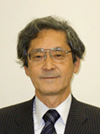 |
Tomonori Aoyama received the B.E., M.E. and Dr. Eng. from the University of Tokyo, Japan。 Since he joined NTT in 1969, he has been engaged in research and development on communication networks and systems in the Electrical Communication Laboratories. From 1973 to 1974, he stayed in MIT as a visiting scientist. In 1994, he was appointed to Director of NTT Opto-Electronics Laboratories , and in 1995 he became Director of the NTT Optical Network Systems Laboratories. In 1997, he left NTT, and joined the University of Tokyo as a professor in the Department of Engineering. In April 2006, he moved to Keio University as a processor, and is also serving as R&D Advisor in NICT (National Institute of Information and Communication Technologies). Dr. Aoyama is Emeritus Professor of the University of Tokyo, and served as |
a member of the Science Council of Japan for 6 years. He is IEEE Life Fellow and is currently serving as IEEE Tokyo Section Chair. He served as President of IEICE (Institute of Electronics, Information and Communication Engineers) previously and is now IEICE Fellow. Dr. Aoyama is Chair of the Global Inter-Cloud Technology Forum (GICTF), Vice-chair of Japan Cloud Consortium (JCC), Ubiquitous Networking Forum and the New Generation Network Promotion Forum, and is serving as President of NPO, Digital Cinema Consortium of Japan (DCCJ). He received several awards from Japanese Ministries, some organizations, IEICE and IEEE.
Plenary Talk 2
"ETRI's R&BD vision and core technologies for the future"
Dr. Heungnam Kim (President, ETRI, Korea)
Abstract:
ETRI has the vision to be a Smart & Green Technology innovator. In order to achieve this vision, we have three strategic management goals; innovative creation of world class technology, strategic management of knowledge asset such as standard and patent, and industry friendly technology transfer for the better world realization. ETRI has been always at the leading position in ICT development last more than 30 years. As the Smart and Green Technology Innovator, we are currently focusing on six major areas, software, networking, broadcasting, IT component material, content technology, and convergence technology mentioned above. We believe our better future can be realized by ICT technologies. In my talk, I’ll introduce which technologies we are focusing and how to combine these technologies for the better future world.
Short Biography:
ETRI has the vision to be a Smart & Green Technology innovator. In order to achieve this vision, we have three strategic management goals; innovative creation of world class technology, strategic management of knowledge asset such as standard and patent, and industry friendly technology transfer for the better world realization. ETRI has been always at the leading position in ICT development last more than 30 years. As the Smart and Green Technology Innovator, we are currently focusing on six major areas, software, networking, broadcasting, IT component material, content technology, and convergence technology mentioned above. We believe our better future can be realized by ICT technologies. In my talk, I’ll introduce which technologies we are focusing and how to combine these technologies for the better future world.
Short Biography:
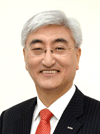 |
Dr. KIM, Heung-Nam is currently President of ETRI (Electronics and Telecommunications Research Institute) in Korea, appointed in November 2009. Before that, he has served as Vice President of ETRI R&D Planning & Strategy Division for one year and Vice President of ETRI Embedded Software Research Division for 4 years. He also has served as a Chairperson at ETRI Innovation Committee. Previously, he joined ETRI in 1983 as a Researcher at System Engineering Research Laboratory at KIST’s subsidiary. Dr. KIM's technological and business background based upon his 20 year large-scale national R&D project experiences: Real-time Operating System Technology, Embedded Software Industry Strategy, HomeSerV Technology, Embedded Software Standard Platform Technology, Wireless Home Network based HD Multimedia Service |
Technology, and Terminal-adaptive Embedded Operating System Technology for Mobile Convergence Computing. His work produced a number of research papers, patents, and publications, overseas and domestically. He received a BS in Electronics Engineering from Seoul National University, Seoul, Korea and a MS Completion in Computer Science from Ball State University, USA. He received his PhD in Computer Science from Pennsylvania State University, USA.
Plenary Talk 3
"Rethinking about the Cellular Networks -
A Novel Hyper-Cellular Architecture for Green and Smart ICT"
Prof. Zhisheng Niu (Tsinghua University, China)
Abstract:
Cellular concept was invented to improve the spectrum efficiency by spectrum reuse and has contributed a lot for the explosive deployment of today’s mobile communication industry. As mobile data and video traffic is fast growing, the next-generation mobile communication (5G?) networks are expected to further provide 10-fold more capacity than 4G mobile networks with the limited spectrum as well as energy resources. To deal with this challenge, the traditional physical- and MAC-layer capacity-enhancement approaches are no more sufficient and efficient. A system- or network-level approach is needed, including rethinking about the existing cellular structure. On the other hand, cellular networks are transforming from just a mobile communication platform to a smart information infrastructure on which more and more always-online type of traffic (e.g., short but frequent signaling packets of various social networks, sensing information of smart earth and smart community, control packets in cooperative heterogeneous wireless networks) need to be handled in an energy-efficient way. As a result, the existing cellular framework should be revisited. In this talk, we propose a new cellular architecture, named hyper-cellular networks (HCN), aiming at increasing the whole network capacity by more than 10-fold based on the existing limited spectrum and energy resources as well as accommodating ever-increasing always-online traffic in a more energy-efficient way. The key idea here is to separate the coverage of control signals from the coverage of data signals so that the data coverage can be more elastic in accordance with the dynamics of traffic needs and QoS requirements. Some preliminary results have shown that this new paradigm has a great potential in the capacity enhancement and energy saving.
Short Biography:
Cellular concept was invented to improve the spectrum efficiency by spectrum reuse and has contributed a lot for the explosive deployment of today’s mobile communication industry. As mobile data and video traffic is fast growing, the next-generation mobile communication (5G?) networks are expected to further provide 10-fold more capacity than 4G mobile networks with the limited spectrum as well as energy resources. To deal with this challenge, the traditional physical- and MAC-layer capacity-enhancement approaches are no more sufficient and efficient. A system- or network-level approach is needed, including rethinking about the existing cellular structure. On the other hand, cellular networks are transforming from just a mobile communication platform to a smart information infrastructure on which more and more always-online type of traffic (e.g., short but frequent signaling packets of various social networks, sensing information of smart earth and smart community, control packets in cooperative heterogeneous wireless networks) need to be handled in an energy-efficient way. As a result, the existing cellular framework should be revisited. In this talk, we propose a new cellular architecture, named hyper-cellular networks (HCN), aiming at increasing the whole network capacity by more than 10-fold based on the existing limited spectrum and energy resources as well as accommodating ever-increasing always-online traffic in a more energy-efficient way. The key idea here is to separate the coverage of control signals from the coverage of data signals so that the data coverage can be more elastic in accordance with the dynamics of traffic needs and QoS requirements. Some preliminary results have shown that this new paradigm has a great potential in the capacity enhancement and energy saving.
Short Biography:
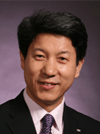 |
Zhisheng Niu graduated from Northern Jiaotong University (currently Beijing Jiaotong University), Beijing, China, in 1985, and got his M.E. and D.E. degrees from Toyohashi University of Technology, Toyohashi, Japan, in 1989 and 1992, respectively. After spending two years at Fujitsu Laboratories Ltd., Kawasaki, Japan, he joined with Tsinghua University, Beijing, China, in 1994, where he is now a professor at the Department of Electronic Engineering and the deputy dean of the School of Information Science and Technology. His major research interests include queueing theory, traffic engineering, mobile Internet, radio resource management of wireless networks, and green communication and networks. Dr. Niu has been an active volunteer for various academic societies, including chair of APCC Steering Committee (2003- |
04), chair of IEICE Beijing Section (2003-07), editor of International Journal of Wireless Networks (2005-09), council member of Chinese Institute of Electronics (2006-11), vice chair of the Information and Communication Network Committee of Chinese Institute of Communications (2008-12), councilor of IEICE-Japan (2009-11), and membership development coordinator of IEEE Region 10 (2009-10). In particular, he has been serving for IEEE Communication Society as chair of Beijing Chapter (2001-08), director of Asia-Pacific Region (2008-09), director for Conference Publications (2010-11), and editor of IEEE Wireless Communication Magazine (2009-12). He has also been serving as general co-chairs of APCC’09/WiCOM’09, TPC co-chairs of APCC’04/ICC’08/WOCC’10/ICCC’12, panel co-chair of WCNC’10, tutorial co-chairs of VTC’10-fall/Globecom’12, and publicity co-chairs of PIMRC’10/WCNC’02. He was the guest co-editors of the IEICE Transactions on Communications Special Issue on Advanced Information and Communication Technologies and Services (Oct. 2009), the EURASIP Journal on Wireless Commun. and Networking Special Issue on Wireless Access in Vehicular Environment (WAVE) (2009), the IEEE Wireless Communication Magazine Special Issue on Green Radio Communications and Networks (Oct. 2011), and the Communication Networks Special Issue on Green Communication Networks (to be published in 2012). Prof. Niu received the Best Paper Awards from the 13th and 15th Asia-Pacific Conference on Communication (APCC) in 2007 and 2009, respectively, and Outstanding Young Researcher Award from Natural Science Foundation of China in 2009. He is now the Chief Scientist of the National Fundamental Research Program (so called “973 Project”) of China "Fundamental Research on the Energy and Resource Optimized Hyper-Cellular Mobile Communication System" (2012-2016), which is the first national project green communications in China. He is the fellow of IEEE and IEICE, and a distinguished lecturer of IEEE Communication Society (2012-13).
Plenary Talk 4
"Challenges in Today's Telco R&D"
Dr. James W. Hong (Senior Executive Vice President, KT)
Abstract:
The boom of the Internet and mobile services has drastically changed the landscape of telecommunications and the related industries for the past decade. One of the most interesting changes is that telcos responsibility for traffic delivery have suffered from the revenue drops due to traffic increase and subsequent costs as well as the pressure for the infrastructure evolution while users have been enjoying eye-popping new convenient services almost for free. In the mean time, various kinds of over-the-top players like Skype, Kakao Talk and Netflix have emerged in the market and immediately made their presence felt through the industries by raking in the profit which used to be traditionally telco’s. In addition, the strong market powers like device platform players have come into the whole application ecosystem by creating new services which was once solidly preserved by telco’s walled garden. These alarming market situations and trends explain the challenges telcos are facing these days and indicate the rough road ahead of them, as well as the roles of R&D. In this talk, we will address major issues in several telco business areas like traffic delivery, computing infrastructures, platforms and services including communications and convergence with the direction of problem solving. We will also touch on how to create a sustainable ecosystem in networking and traffic delivery and still meet the required scales and quality for the future traffic-intensive services. The efficient way to integrate cloud computing infrastructures and telco services will be an interesting topic and surely will draw many attentions. How to deploy the industrial converged services will be discussed as well as how to build the open ecosystem in favor of telco industry.
Short Biography:
The boom of the Internet and mobile services has drastically changed the landscape of telecommunications and the related industries for the past decade. One of the most interesting changes is that telcos responsibility for traffic delivery have suffered from the revenue drops due to traffic increase and subsequent costs as well as the pressure for the infrastructure evolution while users have been enjoying eye-popping new convenient services almost for free. In the mean time, various kinds of over-the-top players like Skype, Kakao Talk and Netflix have emerged in the market and immediately made their presence felt through the industries by raking in the profit which used to be traditionally telco’s. In addition, the strong market powers like device platform players have come into the whole application ecosystem by creating new services which was once solidly preserved by telco’s walled garden. These alarming market situations and trends explain the challenges telcos are facing these days and indicate the rough road ahead of them, as well as the roles of R&D. In this talk, we will address major issues in several telco business areas like traffic delivery, computing infrastructures, platforms and services including communications and convergence with the direction of problem solving. We will also touch on how to create a sustainable ecosystem in networking and traffic delivery and still meet the required scales and quality for the future traffic-intensive services. The efficient way to integrate cloud computing infrastructures and telco services will be an interesting topic and surely will draw many attentions. How to deploy the industrial converged services will be discussed as well as how to build the open ecosystem in favor of telco industry.
Short Biography:
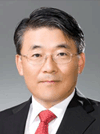 |
.James Won-Ki Hong is currently the Senior Executive Vice President and Chief Technology Officer of KT (Korea Telecom), the largest telecommunications company in Korea since March of 2012, leading R&D activities of KT and its subsidiary companies. Prior to joining KT, he has been a Professor at POSTECH for 17 years serving as the Head of the Division of IT Convergence Engineering, Chair of the Dept. of Computer Science and Engineering, Dean of Graduate School for Information Technology and Director of POSTECH Information Research Laboratories. He was a co-founder and CTO of Netstech, a Palo Alto based startup, developing network integrated ultra-dense, blade servers from 2000 to 2002. His research interests include network management, network monitoring and analysis, ICT convergence, ubiquitous computing, and smartphonomics. |
He has served as Chair (2005–2009) of the IEEE Communications Society(ComSoc) Committee on Network Operations and Management (CNOM). He has also served IEEE ComSoc Director of Online Content (2004–2005, 2010–2011). He is Editor‐in‐Chief of International Journal on Network Management (IJNM) and Editor‐in‐Chief of ComSoc Technology News. He is the Chair of Steering Committee of IEEE/IFIP NOMS/IM International Symposiums and Steering Committee member of APNOMS. He was General Chair of APNOMS 2006, and General Co-Chair of APNOMS 2008 and APNOMS 2011. He was General Co-Chair of IEEE/IFIPS NOMS 2010. He is an editorial board member of IEEE TNSM, JNSM and JCN. He received a Ph.D. degree from the University of Waterloo in 1991.
Plenary Talk 5
"Economic Trends and Limits in Communications and Computing"
Prof. Bijan Jabbari (George Mason University, USA)
Abstract:
Over the past fifty years the economics associated with technologies underpinning transport and computing resources have almost periodically changed the network architecture to yield optimum cost-performance scenarios. In recent years, the distributed nature of applications, virtualization of resources, and other factors have had significant implications on the way networks are implemented. In this talk, we start with the basic law governing the computational resource growth and how it would influence on the forwarding and processing of packets. We will examine the limits and their impact on the economy of scale.
Short Biography:
Over the past fifty years the economics associated with technologies underpinning transport and computing resources have almost periodically changed the network architecture to yield optimum cost-performance scenarios. In recent years, the distributed nature of applications, virtualization of resources, and other factors have had significant implications on the way networks are implemented. In this talk, we start with the basic law governing the computational resource growth and how it would influence on the forwarding and processing of packets. We will examine the limits and their impact on the economy of scale.
Short Biography:
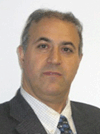 |
Bijan Jabbari is a professor of electrical and computer engineering at George Mason University, Fairfax, Virginia, USA, and an affiliated faculty with ENST- Paris, France. He has held industrial positions with major communications service providers and networking equipment organizations developing data communications products. He has founded innovative laboratories for Internet and wireless communications research and is conducting research through funding provided by National Science Foundation and other funding organizations. Dr. Jabbari was an International Division Editor for Journal of Communications and Networks (JCN), an editor for the IEEE Transactions on Communications and was on the editorial board of Proceedings of the IEEE and several other journals. He is a coeditor of recent books on Multiaccess, Mobility and Teletraffic (Kluwer |
Publishing, Volume I and IV-VI) and continues research on multiaccess and wireless communications, mobility and traffic theory, and packet networks. He is the past chairman of the IEEE Communications Society technical committee on Communications Switching and Routing. He is a Fellow of IEEE and IEE, is a recipient of the IEEE Millennium Medal in 2000 and the Washington Metropolitan Area Engineer of the Year Award, in 2003. Dr. Jabbari has been a technical advisor to the industry and government on issues ranging from transport to switching and routing. He helped industry adoption of MPLS by service providers and large corporations in their networks. He received the Ph.D. degree from Stanford University, Stanford, California, in electrical engineering.
